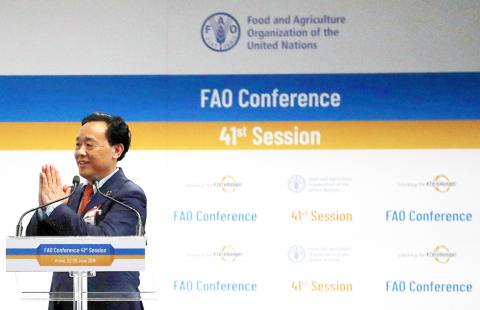Chinese Deputy Minister of Agriculture Qu Dongyu (曲東玉) was on Sunday elected as the new director general of the UN Food and Agriculture Organization (FAO), the first person from a communist country to hold the influential post.
The agency’s 194 member countries convened at the organization headquarters in Rome to choose a successor to Jose Graziano da Silva of Brazil for the four-year term.
Qu, 55, a biologist by training, won 108 votes, followed by France’s Catherine Geslain-Laneelle with 71 votes and Georgia’s Davit Kirvalidze with 12, according to official results.

Photo: EPA-EFE
The US had backed Kirvalidze.
The organization, which has more than 11,500 employees, works closely with other UN agencies to achieve the goal of a hunger-free world by 2030.
Today, more than 800 million people are facing hunger and many experts doubt that the 2030 goal will be reached.
Prior to the vote, Qu said he aims to focus on hunger and poverty eradication, tropical agriculture, drought land farming, digital rural development and better land design through transformation of agricultural production.
An expert on agriculture and rural areas, he has worked in the field for more than 30 years.
“This is a special day,” he said in his acceptance speech. “This is our day.”
Qu said he was “grateful to his motherland,” but then added he would be faithful to the organization’s missions.
Ahead of his election, he rejected claims that he would be beholden to instructions from Beijing, pledging that China would follow “FAO regulations and rules.”
He also defended his credentials, saying he is “a scientist” educated in Europe, the US and China.
Before joining the ministry, Qu worked at the Chinese Academy of Agricultural Sciences, where he focused on conducting research and innovation, raising rural income, reducing poverty through science and technology, and building a quality assessment system for produce.
Since being appointed deputy minister in 2015, Qu has spearheaded measures such as reforms for rural areas; using information technologies to help agriculture; instituting exchange mechanisms on urban agriculture and promoting brands and specialty industries.

In the sweltering streets of Jakarta, buskers carry towering, hollow puppets and pass around a bucket for donations. Now, they fear becoming outlaws. City authorities said they would crack down on use of the sacred ondel-ondel puppets, which can stand as tall as a truck, and they are drafting legislation to remove what they view as a street nuisance. Performances featuring the puppets — originally used by Jakarta’s Betawi people to ward off evil spirits — would be allowed only at set events. The ban could leave many ondel-ondel buskers in Jakarta jobless. “I am confused and anxious. I fear getting raided or even

Kemal Ozdemir looked up at the bare peaks of Mount Cilo in Turkey’s Kurdish majority southeast. “There were glaciers 10 years ago,” he recalled under a cloudless sky. A mountain guide for 15 years, Ozdemir then turned toward the torrent carrying dozens of blocks of ice below a slope covered with grass and rocks — a sign of glacier loss being exacerbated by global warming. “You can see that there are quite a few pieces of glacier in the water right now ... the reason why the waterfalls flow lushly actually shows us how fast the ice is melting,” he said.

Eleven people, including a former minister, were arrested in Serbia on Friday over a train station disaster in which 16 people died. The concrete canopy of the newly renovated station in the northern city of Novi Sad collapsed on Nov. 1, 2024 in a disaster widely blamed on corruption and poor oversight. It sparked a wave of student-led protests and led to the resignation of then-Serbian prime minister Milos Vucevic and the fall of his government. The public prosecutor’s office in Novi Sad opened an investigation into the accident and deaths. In February, the public prosecutor’s office for organized crime opened another probe into

RISING RACISM: A Japanese group called on China to assure safety in the country, while the Chinese embassy in Tokyo urged action against a ‘surge in xenophobia’ A Japanese woman living in China was attacked and injured by a man in a subway station in Suzhou, China, Japanese media said, hours after two Chinese men were seriously injured in violence in Tokyo. The attacks on Thursday raised concern about xenophobic sentiment in China and Japan that have been blamed for assaults in both countries. It was the third attack involving Japanese living in China since last year. In the two previous cases in China, Chinese authorities have insisted they were isolated incidents. Japanese broadcaster NHK did not identify the woman injured in Suzhou by name, but, citing the Japanese